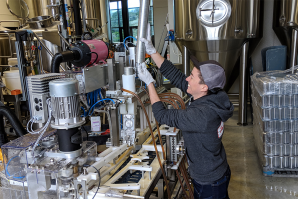Among the picturesque rolling hills, wineries and quaint towns of rural Amador County, hundreds of individuals live in tents and temporary shelters or sleep on couches and in vehicles. They face ample challenges to their health and well-being, which is why community members and local agencies come together each year to uplift and support their unsheltered neighbors with a “stand down” — an overnight, two-day event where those facing or experiencing homelessness can eat freshly prepared meals, access services and even have a safe place to sleep. It’s based on a military term, which refers to a reprieve where troops return to base camp to regroup and receive food, services and clothing before returning to combat.
Now in its fifth year, the Homeless Resource Fair is a project of the outreach subcommittee of Amador County’s Homeless Task Force. Inspired by similar events hosted by Veterans Affairs groups, committee member Tyx Pulskamp suggested the task force host a stand-down event for its growing homeless population in 2018. Committee member and Cal Voices peer support specialist Trixxie Smith works with Pulskamp, a handful of other committee members and 20 to 50 volunteers to organize the event each year.
During the event at Jackson’s Detert Park May 19-20, local businesses offered free haircuts and eye exams, and the county administered free flu shots on-site. The task force also put together a free store, where attendees could find personal hygiene products and kits, canned food, clothing and shoes among other donated goods.
Vendor booths lined the park’s hilltop from churches and religious groups, 12-step recovery groups, county and state agencies, including Social Services, Adult Protective Services and CalFresh, plus health organizations including WellSpace Health and Anthem Blue Cross and several social service agencies. Nearly every vendor offered some kind of favor, from hygiene products to Fila slip-on sandals and various pamphlets and resource guides.
Attendees receive free haircuts from 360 Degree Barber Shop in
Roseville and retired hairstylist Sandy Lynn.

Under the shade of several tall cedar trees, attendees could gather around round tables to sit and share a meal with others. The tables were new this year, an idea from Pulskamp, who works at his family’s restaurant, Rosebud’s Cafe in Jackson. There, his family often feeds their homeless or hungry neighbors free of charge. What began as a supplement during the shutdown of other free community meals during the COVID-19 pandemic led to the family starting a nonprofit, Small Change 4 Big, which feeds and provides other essential services to those in need. The nonprofit was a fiscal sponsor of this year’s resource fair.
During the six meals offered, prepared by local restaurants and volunteers, conversations were shared between agency workers, volunteers and housed and unhoused community members.
“For me, it is all about connection. It is really wonderful because it is especially important in the small community that we live in, because we see the people that we’re helping at work, we’re going to see them at the grocery store, we’re going to see them at the gas station, you know what I mean?” Smith says. “We need to be able to make those connections and have some type of personal connection, because that’s what you do in a small town.”
For Pulskamp, this connection is important to fostering positive change in people’s lives. “It’s so much easier to put off doing something for yourself that you need to do when no one sees you. But once you’re seen, if someone is seeing you and they’re saying, ‘Good morning,’ or whatever, it’s like that — ‘Oh, I’m here,’” Pulskamp says. He explains that building positive connections in the community can impact an individual’s daily life. Even something as simple as recognizing someone on the street can have an impact.
The resource fair can help reduce isolation for both housed and unhoused community members, he says. “We actually need that community integration part just as much as you need the housing part or the mental health part, because if you’re existing in a vacuum outside of the community that you’re in, even if that just is in your mental state; if you feel wholly outside of your community, who can help that?”
The resource fair takes place on a “level playing field,” according to Pulskamp, by being held outside in a public space. “And it’s a nice couple of days in the park to try to learn from each other and figure out what our part is in the next quarter or the next chapter of serving people right here who need so much,” he says.
Lisa relaxes in the shade of the park’s cedar trees while her
friend Richard rests inside a tent in the park, something not
normally permitted by the city of Jackson.

This sentiment was shared by an attendee named Lisa, who asked to have her last name withheld. She attended both days of the fair and was one of the few who camped overnight in a tent in the park, something not normally permitted by Jackson city police. Several others slept in the parking lot in their vehicles.
“It was actually a great day,” Lisa says on Monday evening. “I talked to and met a lot of people.” She also won one of the event’s highly coveted raffle prizes, a portable 100-watt solar power supply donated by Global Citizen. “I can charge anything now,” she says, adding that this was only the second thing she had ever won in her life, at 57 years old. Her friend and camping mate, Richard, won a gas card. Both were grateful for the safety of the stand down at the park. “There’s really no place anybody can go and sleep in a tent or even a car without being harassed,” Lisa says.
Leslie Miller, a 52-year-old Jackson resident who volunteered in the fair’s free store, says that the event changed her life last year. Miller says that this was her fourth time attending the resource fair, but the first time she was sober for it. Celebrating nine months clean from methamphetamine, Miller, who says she was an addict for 35 years, credits her success in getting sober and off of the streets to “all the love and all the support and prayers from the people, from the churches and from everybody.”
Thanks to connections made at the resource fair with people like Trixxie Smith and the support of community organizations like Sierra Wind Wellness and Recovery Center and local churches, she was able to enter rehab and find placement in a residential sober living facility. Next month, she’ll start her first job in over 30 years, working with Amador County Transit. Miller hopes to eventually go to school to become an addiction counselor and help others like her.
“I don’t ever want to lose this shine ever again. I don’t,” Miller says. “I really want to be recognized as a success story, because I want others to see that it’s possible.”
–
Subscribe to the Comstock’s newsletter today.
Recommended For You

Dare to Dream
Entrepreneurship runs on resiliency
For many entrepreneurs, the past few years have served as something of a litmus test. From lockdowns and layoffs to a tumultuous economy, business owners have had to take a hard look at themselves and ask: How badly do I want to do this?

The Power of Podcasting
Podcasts have become a popular media option in the Capital Region
The anything-goes medium encompasses all kinds of local practitioners, from storytellers recording in their home offices to laughing exchanges recorded in band rehearsal rooms.

The Canned Craze
Canned cocktails and wines are light and easy to tote, perfect for a backyard barbecue, summer concert, picnic or anytime
The canned alcohol trend isn’t hard to spot. Just stroll through your local grocery store and you’ll see those colorfully packaged cans of prosecco and prickly pear margaritas all dressed up and ready to go, perfect for a picnic or poolside party.

The Thrill of the Ring
Sacramento’s small-town professional wrestling scene is just as colorful as the big league
The alley entrance of a warehouse behind the Broadway Taco Bell on a recent Saturday was a portal to another world. A world of drama, where fans chanted and booed lustily, the air redolent of masculine funk.



